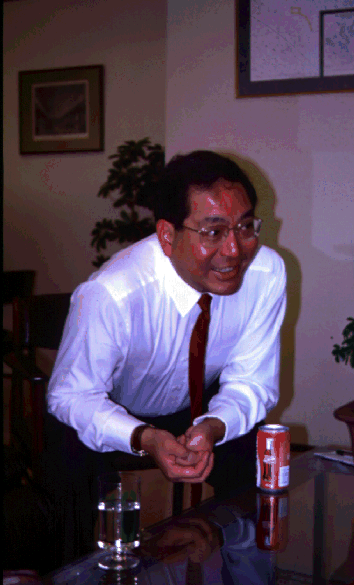
Open the closed door
An interview with Professor Li
By Moira Lau
In April this year, Professor Arthur Li Kwok Cheung was nominated as the new Vice-Chancellor of The Chinese University of Hong Kong. He agreed to put forward his name in the list after one week’s consideration. He was then selected by the University’ selection council which had aroused great debates. Finally, he accepted the post and would succeed Vice-Chancellor Charles Kao Kuen in August 1996.
In a white shirt with a logo “ALKC”, standing for the short form of his name, and a Chinese University tie, Professor Li opened the interview with soft humours in answering various questions concerning his new post.
Q: You are said as outspoken and believ ers of justice. Yet, you accepted t he post of which the election was in camera. Do you worry that your repu tation will be damaged?
A:I don’t think criticism is always bad. Only when you care about something then you will criticize it. Actually, I recognize students’ participation along the selection process. How- ever, the students must be representa- tive enough and they should agree to keep the confidentiality. As they turned down this request, they were not accepted to the election process.
Q: Why do you insist on confidential- ity?
A: What’s good about not keeping con- fidential? Let’s take Professor Woo Shien Biau’s case as an example. His reputation was ruined. Then, no one will be willing to be nominated if they are not well protected.
Q: How can students be ensured that you would listen to them?
A: Give you an example. As the dean of the Medicine Faculty, I welcome my students to come to my office when- ever they like to complain about lec turers, courses, policies and so on. Five professors out of 21 demanded resignation themselves in these years.
Q: Practically what will you do to in- crease the communication then?
A: I have publicly promised students a direct line to access me. Every Chi- nese University student can come to my office. I believe in an “inverted pyramid” administrative structure in which the role of the Vice-Chancel- lor is to serve and support the univer- sity from the bottom.
Q: Will you fight for a four-year system as you have once promised?
A: I will cooperate with the other six universities’ Vice-Chancellors. If we all pursuit in the same interests, I believe the future government will concess to recover the original system. We can take advantage of being the most experienced univer- sity in running this system.
Q: What role does the Chinese Univer sity play in Asia in this political tran- sitional period?
A: Hong Kong will no longer be a colo- nized country. She can find her own China which she indeed belongs to. This is of great value to our univer- sity as it emphasizes the value of traditional Chinese culture most among universities in Hong Kong.
On the other hand, we have many talented human resources and I will never surrender our right to academic freedom in any cases as the Chinese University have won a moral high ground in its culture. I will try my best to give support to our student union, provided that they behave in a polite, responsible manner.
Q: What would you say about Vice- Chancellor Charles Kao Kuen?
A: He is a very good person with good personal relations. He strives to achieve many goals but fails in some of them. That’s why people are disap- pointed. Yet, actually he contributes much especially in upgrading the quality of research of the university.
Q: How do you perceive your being the Hong Kong Affairs Adviser to China?
A: I am working for Hong Kong, not for China. I just would like to contribute myself to Hong Kong in any way I can do to help. I want to make foreigners have faith in Kong Kong’s future. So far I still believe that the Chinese government will keep her promise as stated in the Basic Law.
Q: Please give a statement to the Chi- nese University students.
A: Treat me as a Chinese University student also — I am one of you to learn every new thing.

|

